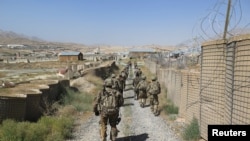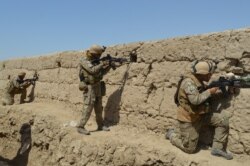U.S. Defense Secretary Mark Esper said Monday he has not issued any orders to reduce troops levels in Afghanistan, but that he would like to shift some forces to other missions, including those focused countering China in the Indo-Pacific region.
Speaking to reporters while flying back from a stop in Luxembourg, Esper said he would be consulting with Secretary of State Mike Pompeo and "take this a day at a time," but that ultimately the decision is up to President Donald Trump.
Earlier Monday, the U.S. military told VOA there were no reduction orders in place and that it remains fully committed to Afghan partners to achieve security objectives.
However, officials in Afghanistan have confirmed to VOA that the United States plans to withdraw thousands of troops from the country, insisting the move stemmed from a mutual understanding between the two allied nations.
On Saturday, U.S. media reported that Trump's administration intends to announce this week plans to reduce the number of American forces in Afghanistan by around 4,000.
U.S. Sen. Lindsey Graham told reporters Monday during a visit to Kabul that Trump is planning a partial withdrawal of troops from the country. He said the president will announce the withdrawal this week, and the process will likely begin next year. He noted that Trump could reduce troop numbers to 8,600, down from the current 12,000.
“The matter regarding the withdrawal of 4,000 troops had already been agreed upon in principle between the governments of Afghanistan and the United States," deputy Afghan presidential spokesman Dawa Khan Meenapal told VOA on Sunday. He emphasized it would be a “gradual withdrawal,” and shared no further details.
Sources in Kabul told VOA the drawdown process is expected to start in three months “depending on the ground realities,” though no official confirmation from the Afghan government was immediately available about the timeline.
A U.S. military spokesman clarified in written comments to VOA that there is no timeline, as they haven’t received orders yet to begin a drawdown.
“We remain fully committed to the Resolute Support mission and our Afghan partners, and focused on our key objective: ensuring Afghanistan is never again used as a safe haven for terrorists who threaten the United States, our allies or our interests,” the spokesman said.
U.S. troops deployed to Afghanistan are conducting counterterrorism missions, in addition to advising and training Afghan security forces battling the Taliban under NATO’s Resolute Support mission.
The withdrawal of foreign forces has been at the center of a peace deal the U.S. has been trying to negotiate with the Taliban for over a year to end America’s longest war.
Trump suspended the dialogue process in September, citing the killing of an American soldier in a series of Taliban attacks in Kabul.
The two adversaries returned to the negotiating table in Qatar a week ago, but Washington paused the talks again on Thursday in retaliation of a Taliban raid on Bagram Airbase, the largest U.S.-run military base in Afghanistan. The attack killed two Afghan civilians and injured scores of others.
After months of meetings, U.S. and Taliban negotiators concluded a draft agreement that outlined the Taliban’s counterterrorism guarantees in exchange for a phased withdrawal of U.S. and allied forces.
The proposed document would also require the insurgent group to reduce violence and enter into intra-Afghan negotiations to seek a permanent end to decades of hostilities in Afghanistan.
Critics have cautioned against an abrupt withdrawal of foreign forces, fearing it will embolden the insurgents.
But former Afghan military general, Atiqullah Amarkhel, insisted that as long as Afghan forces continued to receive financial assistance to sustain their operational costs, the reduction in foreign troops will not have any impact because neither U.S. nor NATO troops are taking part in battlefield activities.
Reports of the U.S.'s withdrawal come just days after The Washington Post released hundreds of documents showing U.S. officials and military commanders had been lying about the progress of the war.
The revelation has encouraged the Taliban to intensify its propaganda against the presence of foreign troops in Afghanistan and justify the violence.

